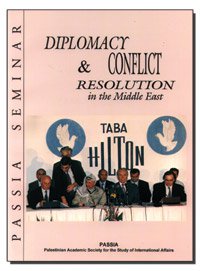Diplomacy & Conflict Resolution in the Middle East
PASSIA’s 1997 seminar on Diplomacy and Conflict Resolution in the Middle
East aimed to train Palestinian graduates in the concepts, terminology
and methodology of diplomacy and conflict resolution in general, and
their practical implication within the political settings of the Middle East in
particular. The first part of the report contains the lectures and presentations
given during the seminar as well as a summary of the subsequent discussions.
The second part includes background research done by the participants
as part of their preparation for the seminar, while the third part contains
a selection of the essays they were assigned at the end of the seminar. In
the appendices, one can find information about the lecture program, the
lecturers, the Palestinian participants, and a list of relevant reading material.
Overview
PASSIA's seminar on Diplomacy and Conflict Resolution in the Middle East was part of PASSIA's annual Training and Education in International Affairs program.
The Seminar 1997 aimed to train Palestinian graduates in the concepts, terminology and methodology of diplomacy and conflict resolution in general, and their practical implication within the political settings of the Middle East in particular. It is part of PASSIA's endeavor to meet the needs of the Palestinian community for formal education, training and practical experience in areas that are receiving increasing attention as Palestinians define and address their own political and economic needs.
PASSIA hopes that this seminar will assist Palestinians to continue the process of state-building and to enhance relations and understanding with others in the international community.
The first part of the following report contains the lectures and presentations given during the seminar as well as a summary of the subsequent discussions. The second part includes background research done by the participants as part of their preparation for the seminar while the third part contains a selection of their Essays on Diplomacy and Conflict Resolution that were assigned at the end of the seminar.
In the appendices, one can find information about the lecture program, the lecturers, the Palestinian participants, and a list of relevant reading material.
PASSIA would like to take this opportunity to express its deep appreciation to those whose kind support made this seminar program possible.
We also thank most warmly the guest lecturers from Europe and the US, and all the local and regional scholars whose lectures and expertise contributed greatly to the success of the seminar.
Last but not least, the PASSIA team would like to thank the Palestinian participants for their commitment and enthusiasm to learn about Arab states’ foreign policies.
Jerusalem, April 1997
The PASSIA Academic Committee

